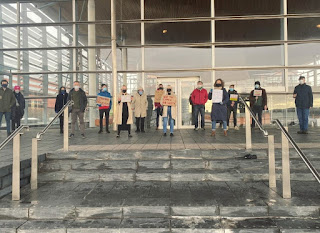'Wales is not for sale' multi-site rally held on November 21st. From Llanberis to Carmarthen, and from Aberaeron to our national Parliament in Cardiff, and from every corner of Cymry, the message to the Welsh Government is this: act now to solve the housing crisis in Wales. CIG calls on the Welsh Governmentto provide Local Authorities with an emergency package of powers now to manage the situation. The fact that over 5,300 people have now signed the petition underlines the need for urgent Government action. #NidYwCymruArWerth
Language campaigners were holding rallies in Llanberis, Aberaeron and Carmarthen on Saturday, to highlight the housing market situation in Wales. Campaigners are calling on the Welsh Government to "do everything it can to tackle the crisis", including giving local authorities powers to control the housing market and introducing a Property Act.The calls are part of Cymdeithas yr Iaith's 'Not for sale' campaign, which includes a current petition.The Welsh Government says it recognizes the need to find solutions so that people are not priced out of their areas.
There were rallies in Carmarthen and Llanberis, and language campaigners in Ceredigion walk from Llanrhystud to a rally in Aberaeron. A spokeswoman for Cymdeithas yr Iaith and one of the speakers at the rally in Carmarthen, Sioned Elin, said:
"We can't wait until a new government election next year, as house prices have risen so much in rural areas that local families are being forced out of the market.The government now needs to give Local Authorities an emergency package of powers to manage the situation. The fact that over 5,300 people have now signed the petition underlines the need for urgent Government action."
Osian Jones, spokeswoman for Cymdeithas yr Iaith's 'Wales is not for sale' campaign, added: "'The current observatory is beyond depressing. The right to live at home is a key to any living community but unfortunately, in an increasing number of areas in Wales young people find it impossible to settle into their communities.This is not their fault of course: the problem is beyond their control and stems from the fact that the housing system is part of the open market which means it is not adequately controlled. The result of this is a housing system that is not working for the benefit of our communities and has now become a crisis. Because of this, we will be campaigning on Saturday to call on the Welsh Government to introduce a series of emergency measures, which would include giving Local Authorities the powers to control the housing market. And in the long term, the Government will need to come up with a series of structural solutions, such as a Property Act, to ensure that this kind of crisis does not happen again and that the housing market works for the benefit of communities, not capitalism. "
These calls form a part of Cymdeithas yr Iaith’s ‘Wales is not for sale’ campaign which also includes a petition on the Senedd website with currently over 5,300 signatories.
“We can’t afford to wait until the election of a new government next year, as house prices have rocketed upwards during the pandemic in the rural areas, and local people are being forced out of the market,” Sioned Elin, a Cymdeithas yr Iaith spokesperson and one of the speakers at the rally in Carmarthen, said.
“The Government must act now to give Local Authorities emergency powers to control the housing market. The fact that over 5,300 people so far have signed our petition emphasises this urgent need for the Government to act now.”
The prospective Plaid Cymru Senedd candidate for Dwyfor-Meirionnydd, Mabon ap Gwynfor, will speak at the main rally in Llanberis, along with Elin Hywel (chair of Cymdeithas yr Iaith’s Communities Group) and Rhys Tudur (Nefyn town councillor).
Bethan Ruth, Mirain Iwerydd and Hywel Griffiths, will speak at the rally in Aberaeron, while Cllr. Cefin Campbell (who holds the Rural Affairs portfolio on Carmarthenshire Council), Cllr. Cris Tomos (who holds the Environment and Language portfolio on Pembrokeshire Council) and Sioned Elin will speak at the rally in Carmarthen.
“The right to live at home is completely fundamental if we are to ensure the continued viability of our communities, but unfortunately, young people are facing impossible barriers to settle in their own communities in an increasing number of areas in Wales.
“This is obviously not their fault, as this problem is completely beyond their control and delves from the fact that the housing market is a part of the open market which means that there isn’t sufficient public control over it. This results in a housing system that doesn’t work for our communities and that has now developed into a crisis.
“Because of this, we will be campaigning on Saturday and calling on the Welsh Government to introduce a series of urgent measures which would include giving Local Authorities the powers that they need to control the housing market.
“In the long-term, the Welsh Government also needs to introduce significant structural reforms, which includes a Property Act, in order to ensure that a crisis of this kind doesn’t arise again in the future and that the housing market works for communities, not capitalism.”


































